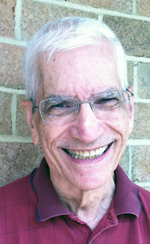
NEW YORK — Going back 70 years, three different people told me I was the first Jew they had ever met.
A fellow soldier from New England was the first with the news; the second, another New Englander, was a reporter with me on a Manhattan-based trade newspaper; and the third, a young woman from Colorado whom my wife and I met on vacation on an island (not Staten) who made the announcement to us that we were her “firsts.”
Still, at best, being the recipient of such “first-Jew”news imposes a heavy burden. especially if, like me, your ethnic insecurity caused you to overtip when paying a bill by credit card, because the amount would be visible next to an obviously Jewish last name. Heaven forbid if we should contribute to a “cheap-Jew” stereotype.When told I was the first of my people they’d ever met, my reaction resembled that of the fictional man ordered to ride in a handcart to the guillotine “If not for the honor,” he observed, “I’d rather walk.”
I feel the same way about being the one whose words, deeds and seeming attitudes are about to be judged to reflect that of an entire people.
Sometimes the challenge comes from other Jews.
That year, it was the turn of the Jewish War Veterans to lead the march, and the commander said he was calling all Jews who had served to march that year “so they wouldn’t think Jews hadn’t done their part.”
It struck me as a wild notion on two counts: First, when would we stop acting to. pacify or satisfy them? And secondly, there wasn’t the slightest doubt that Jews had done their part
Although I and many contemporaries were too young to serve in World War II, but were of age for the Korean conflict (and I never went overseas or saw combat in my three years of service), I knew of dozens of Jewish Staten Islanders who saw combat, some of whom were wounded or died in action. In fact, two of my future sisters-in-law were war widows,
The limitations of my military experience didn’t matter to the caller. who, above all, wanted a good numerical turnout.
As a lover of parades — as a watcher not a marcher — my feelings about marching that day were definitely mixed. On the one hand, I didn’t feel I belonged; on the other, they needed me.
Maybe the answer is to do the right thing or the right reasons — very possibly rooted in Jewish ethics …and they, too, will approve.
It was a pretty neat scene, and I couldn’t help wondering : how many Jewish households in the USA included a Muslim woman at prayer? It doesn’t seem at all like a bad idea.
*
Joel H. Cohen is a freelance writer based in New York City.